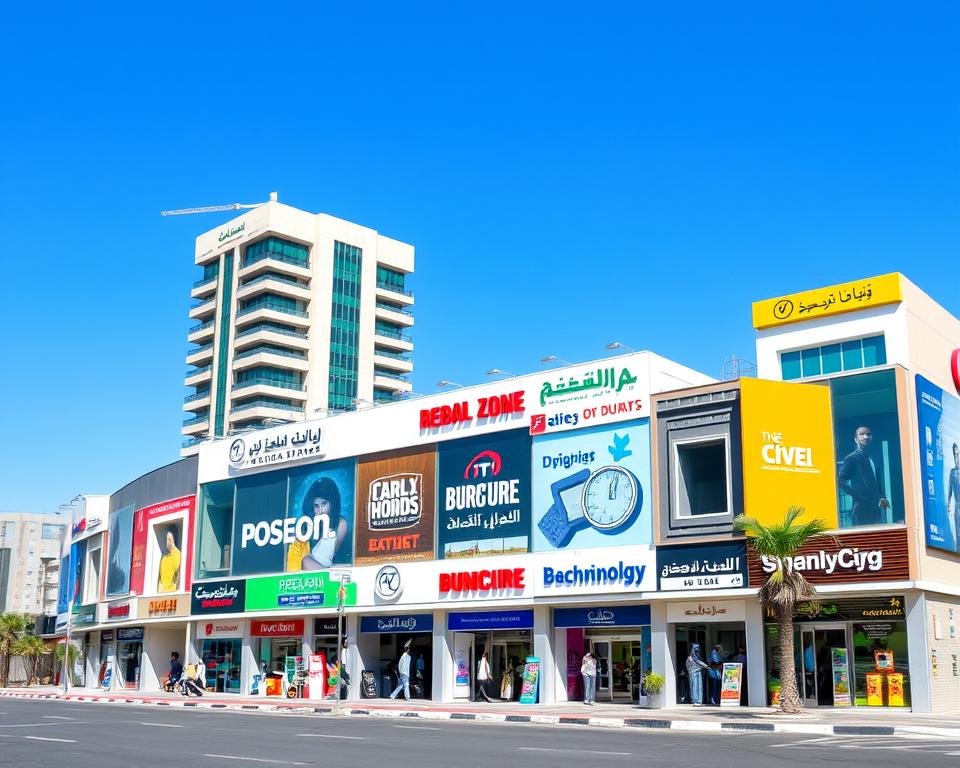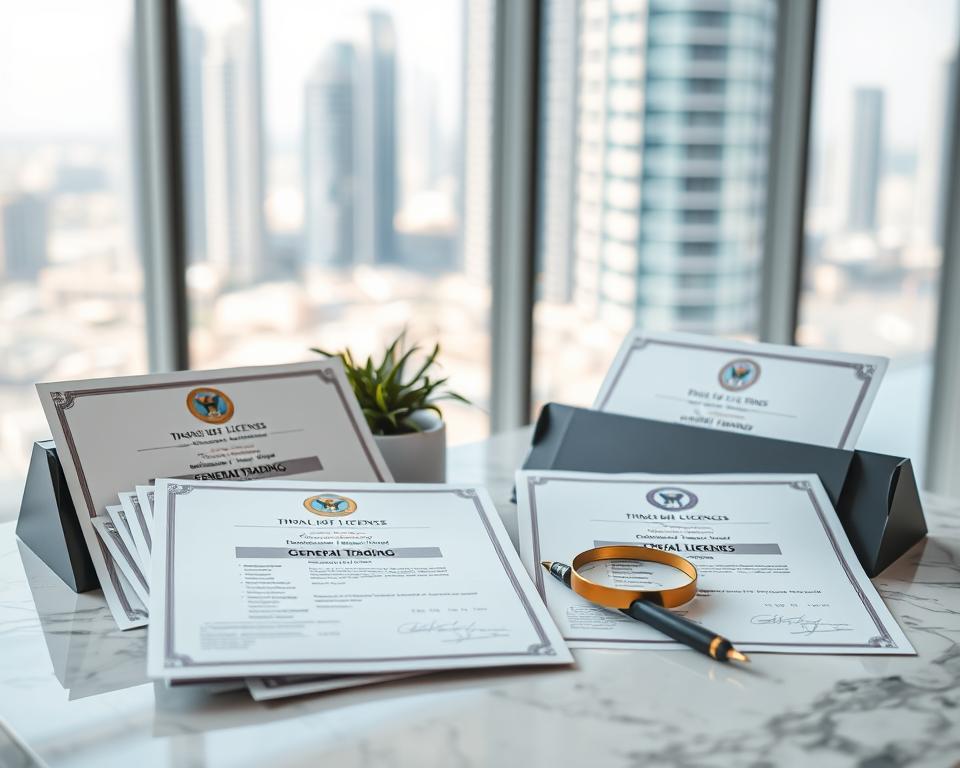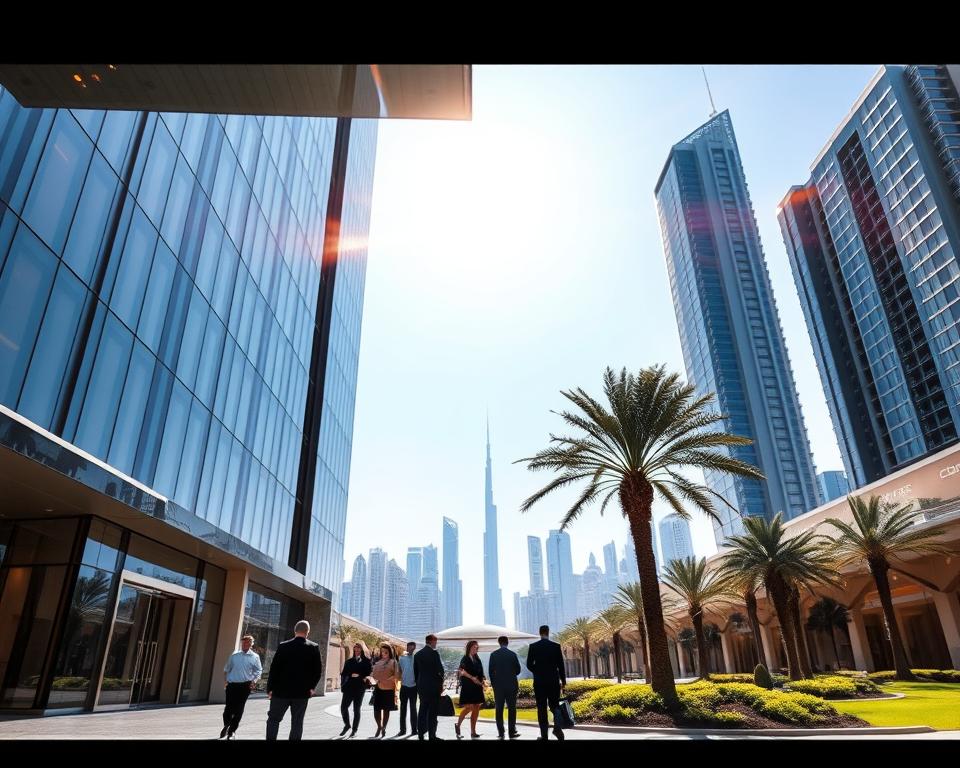Are you an entrepreneur or investor looking to expand your business horizons? Establishing a company in a strategic location can be a game-changer. With its favorable business environment and economic stability, Dubai has become a magnet for global commerce.
This comprehensive guide will walk you through the process of setting up a company in Dubai, covering everything from understanding the local business landscape to obtaining necessary licenses and permits. You’ll gain insights into the benefits of setup in this thriving economy, including recent changes in the tax environment and opportunities in free zone areas.
By the end of this guide, you’ll have a clear roadmap for navigating the business setup process efficiently.
Table of Contents:
- Understanding the Dubai Business Environment
- Types of Business Jurisdictions in Dubai
- Choosing the Right Business License
- Dubai Business Setup: Legal Structures and Ownership
- Selecting a Trade Name for Your Dubai Business
- Step-by-Step Business Registration Process
- Setting Up Your Business Location
- Banking and Financial Setup
- Conclusion: Launching Your Business in Dubai
Understanding the Dubai Business Environment
Dubai’s attractiveness as a business destination is rooted in its unique blend of economic stability and global connectivity. The emirate has established itself as a hub for businesses looking to expand into the Middle East, Africa, and beyond.
Strategic Location and Global Connectivity
Dubai’s strategic location between East and West makes it an ideal gateway for businesses aiming to access markets across Europe, Asia, Africa, and the Middle East. This positioning, coupled with world-class infrastructure, including state-of-the-art transportation networks and telecommunications systems, facilitates global connectivity.
Economic Stability and Growth Projections
The United Arab Emirates has demonstrated economic stability, with Dubai’s GDP growing by 3.6% in the first half of 2024. The Central Bank of the UAE has maintained its real GDP growth projections for 2024 at 4%, indicating a strong and stable economic environment. As noted by a financial analyst, “The UAE’s economic growth is a testament to its business-friendly policies and robust infrastructure.”
“The UAE is considered a low-risk nation for business, with EKN, a Swedish export agency, classifying it with a risk category of 2 out of 7.”
Business-Friendly Policies and Infrastructure
Dubai offers a conducive business environment, characterized by business-friendly policies, minimal bureaucracy, and various initiatives to attract foreign investment. The emirate’s diverse economy spans multiple sectors, including finance, tourism, real estate, technology, and logistics, providing opportunities for businesses of all types and sizes. Key features include:
- Streamlined regulations and minimal intervention in private business operations
- Strong legal frameworks to protect business interests
- Continuous improvements to ease of doing business metrics
- World-class infrastructure supporting various business operations
This supportive environment is further enhanced by government support for businesses, fostering economic growth and development.
Types of Business Jurisdictions in Dubai
The choice of business jurisdiction in Dubai can significantly impact your company’s operations and success. Understanding the different options available is crucial for making an informed decision.
Mainland Companies
Mainland companies in Dubai can operate anywhere in the UAE without location restrictions. They can trade directly with the local market, making them ideal for businesses targeting UAE consumers. Most business activities allow 100% foreign ownership, providing flexibility for international investors.
Free Zone Companies
Free zones in Dubai were specifically designed to attract foreign investment by offering benefits like 100% foreign ownership, tax advantages, and simplified business setup procedures. There are over 30 free zones operating in Dubai, each specializing in different industries such as technology, media, healthcare, finance, and manufacturing.

A key limitation of free zone companies is that they cannot trade directly with the UAE local market without a local partner or distributor. However, the UAE free zone concept provides significant tax benefits, including 0% corporate tax on profits up to AED 375,000.
Offshore Companies
Offshore companies are primarily designed for businesses conducting activities outside the UAE. They offer privacy, asset protection, and no minimum capital requirements. Offshore companies are allowed to have business activities outside the UAE but are restricted from operating within the country.
When planning your business setup in Dubai, one of the most crucial decisions is choosing between mainland, free zone, or offshore jurisdictions. Each option offers distinct advantages and limitations, and understanding these differences is key to making the right choice for your business.
Choosing the Right Business License
Understanding the different business licenses available is essential for setting up a successful business in Dubai. The Department of Economic Development (DED) issues business licenses, and there are six main types that cater to various business activities.
Commercial License
A Commercial License is ideal for businesses involved in trading activities such as import/export, retail, and distribution of goods in the Dubai market. This license type supports businesses that are looking to engage in buying and selling goods.
Industrial License
The Industrial License caters to manufacturing businesses that transform raw materials into finished products. Sectors covered under this license include textiles, metal fabrication, food processing, and chemical production.
Professional License
A Professional License is designed for service providers and professionals offering specialized expertise. This includes consultants, legal advisors, healthcare practitioners, and IT service providers who bring professional services to the Dubai market.
Tourism License
The Tourism License serves businesses in the hospitality and tourism sector, including travel agencies, tour operators, hotels, and tourism-related services that cater to Dubai’s vibrant visitor economy.

Selecting the appropriate license is fundamental, as it must align with the specific nature of your business activities and operations in Dubai. With over 2,100 classified business activities offered by the DED, accurately identifying your business activity is crucial for proper licensing.
Dubai Business Setup: Legal Structures and Ownership
When establishing a business in Dubai, selecting the right legal structure is crucial for determining ownership rights and operational flexibility. The legal structure you choose will significantly impact your company’s liability protection, management flexibility, and growth potential.
Limited Liability Company (LLC)
A Limited Liability Company (LLC) is one of the most popular forms of business structures in Dubai, offering protection of personal assets while allowing for multiple shareholders and management flexibility. LLCs are ideal for businesses that require a high level of liability protection and flexibility in management. Recent regulatory changes have made LLCs even more attractive by allowing 100% foreign ownership in certain sectors.
Sole Proprietorship
Sole Proprietorship is a business structure ideal for individual entrepreneurs and small business owners who want complete control over their business operations and decision-making processes. This structure is relatively simple to establish and maintain, with the owner having full control over the business. However, it also means that the owner’s personal assets are at risk in case of business liabilities.
Branch of Foreign Company
A Branch of Foreign Company allows international companies to establish a presence in Dubai while maintaining their original legal identity and ownership structure from their home country. This option is beneficial for companies looking to expand their operations into the UAE market without establishing a new legal entity. The branch office can operate under the parent company’s name and reputation, leveraging its global presence.
The choice of legal structure for your business in Dubai will depend on various factors, including your business goals, the level of control you wish to maintain, and your liability preferences. It’s essential to carefully consider these factors and seek professional advice to determine the most suitable legal structure for your business.
Selecting a Trade Name for Your Dubai Business
Selecting a trade name for your Dubai business is a crucial step that requires careful consideration of the UAE’s naming conventions and regulations. The trade name is not just a label; it’s a representation of your brand identity in the market. Therefore, understanding the requirements and restrictions is vital for a successful business setup.
UAE Naming Conventions and Restrictions
The UAE has strict naming conventions that businesses must adhere to. “A company’s title must conform to the UAE’s strict naming convention or the relevant economic department may not approve it,” as per the regulations. The trade name must be followed by the acronym of the legal form of the company, such as LLC or FZE. It should not contravene the UAE’s public morals or order, be consistent with the required type of activity, exclude names of any religion or governing authority, and not have been previously registered.
The UAE naming conventions prohibit the use of offensive language, religious references, or names that could be perceived as disrespectful to local customs and traditions. For instance, names that might be considered offensive or insensitive to the cultural context of the UAE are not allowed. Additionally, your company name must accurately reflect the nature of your business activities.
If you wish to name your company after a person, that individual must be a partner or owner in the business. The use of initials or abbreviations is generally not permitted under UAE trade name requirements.
Trade Name Registration Process
The trade name registration process involves several steps that must be followed carefully. Initially, you need to check for name availability to ensure that your chosen trade name is not already in use. Once you’ve confirmed availability, you can submit an application to the relevant economic department. The department will review your application to ensure that it complies with all the naming conventions and regulations.

The registration process requires careful preparation to avoid rejection. Working with a business setup specialist can help navigate the complex trade name requirements and increase the likelihood of first-time approval. They can guide you through the process, ensuring that your trade name complies with all the necessary regulations, thus saving you valuable time.
- The trade name must be followed by the legal form acronym.
- Names cannot include references to globally recognized organizations or government bodies without authorization.
- Once approved, the trade name is reserved for a specific period.
Step-by-Step Business Registration Process
Establishing a business in Dubai involves a systematic process that begins with obtaining initial approval from the relevant authorities. The business setup Dubai process is designed to be efficient and straightforward, ensuring that entrepreneurs can navigate the required steps with ease.
Initial Approval Application
The first step in the setup process is to obtain initial approval from the Department of Economic Development (DED). This can be done online, in person, or through a third-party law firm. The application requires submitting necessary documents, including a business registration and licensing form, passport or ID copy, residence permit/visa copy, company’s articles of association, and a feasibility study of the project.
Document Preparation and Submission
Document preparation is a critical phase where you’ll need to gather various documents specific to your business activity. This includes identification papers, visa information, business plans, and other supporting materials. Ensuring that all documents are accurate and complete is crucial for a smooth process.
Memorandum of Association
A Memorandum of Association (MoA) is a legally binding document that outlines the relationship between shareholders. For certain company formations, it must be prepared and attested by authorized UAE legal entities, such as law firms or notary public offices. This step is essential for the business setup Dubai process.
Obtaining Final Approval and License
The final step involves obtaining final approval and your business license from the Department of Economic Development. This requires submitting all previously approved documents along with proof of office space and payment of applicable fees. The entire process typically takes between 2-4 weeks for mainland companies.
The key steps in the business registration process include:
- Obtaining initial approval from the DED to confirm there are no objections to your business concept.
- Gathering and submitting various documents specific to your business activity.
- Preparing and attesting the Memorandum of Association (MoA) by authorized UAE legal entities.
- Securing final approval and your business license.
Working with experienced business setup consultants can significantly simplify the process by managing document preparation, government interactions, and ensuring compliance with all regulatory requirements. After receiving your license, additional steps include registering with the Chamber of Commerce, opening a corporate bank account, and applying for relevant visas to complete your business setup in Dubai.
Setting Up Your Business Location
Securing the right business location is a critical step in setting up your company in Dubai. The location not only affects your operational efficiency but also impacts your brand’s visibility and accessibility to clients and partners.
Office Space Requirements
All UAE companies must operate from a physical address that complies with the regulations set by the Department of Economic Development and local municipalities. For mainland companies, leasing a minimum of 200 square feet of office space is mandatory, and virtual offices are not permitted.
Free zones, on the other hand, offer more flexibility with options ranging from shared workspaces to smaller dedicated units. This flexibility makes free zones an attractive option for businesses looking to establish a presence in Dubai without the need for a large physical footprint.
Popular Business Districts in Dubai
Dubai is home to numerous business districts, each offering unique advantages. Popular areas include Downtown Dubai, Business Bay, Dubai Internet City, Dubai Media City, and Jumeirah Lake Towers (JLT).
When selecting a business location, consider factors such as proximity to clients, suppliers, and transportation hubs, as well as the availability of supporting services. The choice of location can significantly impact operational costs, staff commuting, and overall brand perception in the Dubai market.
Free zones like DMCC provide comprehensive business ecosystems, including office solutions, residential options, and networking opportunities, creating an integrated community for businesses.
Banking and Financial Setup
A well-structured banking and financial setup is essential for managing your company’s finances effectively in Dubai. This involves several key steps, including opening a corporate bank account and understanding the financial and tax implications of your business setup.
Opening a Corporate Bank Account
Opening a corporate bank account is an essential step in your business setup process, allowing you to manage finances, receive payments, and establish credibility with clients and partners. Dubai offers a wide range of banking options, including local banks like Emirates NBD and Abu Dhabi Commercial Bank, as well as international institutions such as HSBC, Citibank, and Barclays. The corporate bank account opening process typically requires your company’s trade license, memorandum of association, shareholder passports, and various KYC (Know Your Customer) documents.
Financial Considerations and Tax Implications
Businesses in the UAE now face a standard 9% tax rate based on their taxable income that exceeds AED 375,000. Despite this, the UAE continues to offer significant financial advantages, including no personal income tax and potential corporate tax exemptions for qualifying free zone companies. Financial considerations should include budgeting for setup costs, ongoing license renewal fees, office rent, visa expenses, and operational costs. Effective tax planning is increasingly important for Dubai businesses, with strategies available to optimize your tax position through careful structuring of your company and its operations.
Conclusion: Launching Your Business in Dubai
As we conclude this comprehensive guide on setting up a business in Dubai, it’s clear that the emirate offers unparalleled opportunities for entrepreneurs. Dubai’s business environment is characterized by its strategic location, world-class infrastructure, and business-friendly policies.
The process of setting up a business in Dubai has been streamlined, with online platforms enabling investors to establish a company UAE presence quickly. Obtaining the appropriate visa is crucial, with various types available depending on your role and investment level.
- Dubai provides access to residence permits for yourself and your family, offering lifestyle benefits and global mobility advantages.
- The long-term benefits of operating in Dubai’s dynamic economy make the initial setup process worthwhile.
- Ongoing reforms aim to simplify regulations, reduce costs, and enhance the overall ease of doing business.
With proper planning and professional guidance, your business setup Dubai journey can be smooth and rewarding, positioning your venture for sustainable growth. Remember, flexibility and adaptability are key virtues in this fast-evolving market.

